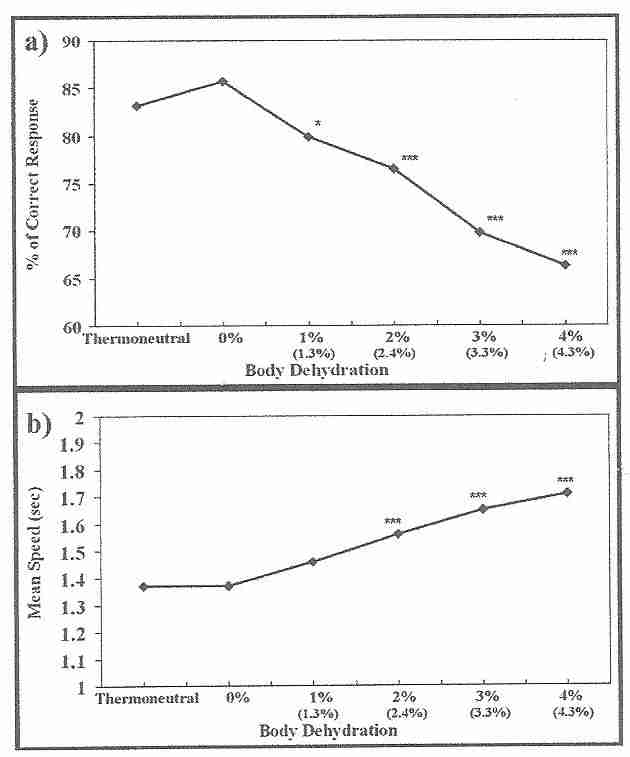
by Ben Best
It is common for health advisors to recommend drinking much water on a daily basis, but rarely are the consequences of doing so or not doing so detailed or supported with scientific evidence.
It has been recommended that a non-exercising adult in a temperate climate consume 3.7 liters (men over age 18) or 2.7 liters (women over age 18) of water daily, including the water in a variety of non-alcoholic beverages. The average water consumption in the United States is less than half the recommended amount [JOURNAL OF THE AMERICAN COLLEGE OF NUTRITION; Campbell,SM; 26(5):585S-587S (2007)]. Food typically contributes 20% to 30% of total water intake (500 milliliters to one liter per day). One to two liters per day of water is lost in urine, about 450 milliliters lost from skin evaporation, about 300 milliliters lost from respiratory evaporation, and about 200 milliliters is lost per day in feces. Body regulation of water balance is typically within 0.2% of body weight in a 24-hour period. Signs of mild-to-moderate dehydration include sleepiness/tiredness, dizziness/light-headedness, and dry,sticky mouth. Exercising in a hot environment can lead to a loss of one to two liters of water per hour through evaporation. Sweating four liters of water without fluid replacement will lose 10% of body water, but only 4% of extracellular sodium [EUROPEAN JOURNAL OF CLINICAL NUTRITION; Jequier,E; 64(2):115-123 (2010)]

|
Young men subjected to about 1.6% dehydration through exercise showed significant reduction in cognitive performance, specifically vigilance and working memory. Anxiety and feelings of fatigue also significantly increased [BRITISH JOURNAL OF NUTRITION; Ganio,MS; 106(10):1535-1543 (2011)]. A study which allowed 6-7 year-old children to drink an average of 409 milliliters (just under two cups) of water demonstrated an improvement in visual attention and visual memory compared to controls who did not drink water [APPETITE; Edmonds,CJ; 53(3):469-472 (2009)]. A similar study showed improved visual attention with an average of only 212 milliliters of water [APPETITE; Edmonds,CJ; 52(3):776-778 (2009)]. Although 2% dehydration is generally given as the threshold of demonstrable effect on attention, visual-motor tracking, short-term memory, and arithmetic efficiency, there is evidence of a dose-response effect for as little as 1% or less [ARCHIVES OF ENVIRONMENTAL HEALTH; Gopinathan,PM; 43(1):15-17 (1988), JOURNAL OF THE AMERICAN COLLEGE OF NUTRITION; Grandjean,AC; 26(5 Suppl.):549S-554S (2007), and JOURNAL OF THE AMERICAN COLLEGE OF NUTRITION; Lieberman,HR; 26(5 Suppl.):555S-561S (2007)].
Drinking water has been shown to reduce the oxidative stress (oxidized glutathione, GSSG) associated with exercise [APPLIED PHYSIOLOGY, NUTRITION, AND METABOLISM; Hillman,AR; 36(5):698-706 (2011)]. Hydration was more effectively retained after exercise by drinking a hypertonic 10% glucose-electrolyte solution than by drinking more dilute solutions [NUTRITION; Evans,GH; 25(9):905-913 (2009)]. Subject running to exhaustion on a treadmill under 3% dehydration showed about 50% more lymphocyte DNA damage, which was alleviated equally by water or a sports drink (containing glucose and electrolytes in addition to water) — but only the carbohydrates and electrolytes in the sports drink restored exercise time to exhaustion to the level of those not subjected to 3% dehydration [BIOCHEMICAL AND BIOPHYSICAL RESEARCH COMMUNICATIONS; Paik,I; 383(1):103-107 (2009)]. A drink with additional glucose polymer (maltodextrin) and conditionally essential amino acids (glutamine and arginine) has proven to be even more effective than a sports drink [JOURNAL OF THE INTERNATIONAL SOCIETY OF SPORTS NUTRITION; Snell,PG; 7:28 (2010)]. Glutamine supplementation has been shown to increase glucose formation and utilization during exercise [JOURNAL OF APPLIED PHYSIOLOGY; Iwashita,S; 99(5):1858-1865 (2005)].